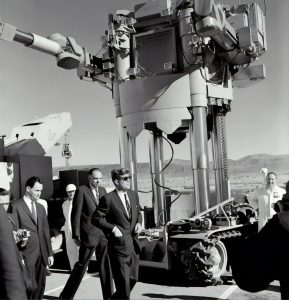This saying is probably from Norman Vincent Peale (1898-1993), a star among American Protestant preachers in the 1950s, author of self-help books and well-known for popularising the concept of positive thinking. Peale was clearly inspired by the space race between the United States and the then Soviet Union where, in the midst of the Cold War, both superpowers sought to demonstrate which regime had the greatest technological advantage.
You may dream of living a healthier life, valuing your loved ones more, or writing the next international bestseller. But if you don't start with firm plans and find a path to progress, it’s likely to come to nothing. For example, you wish to live a healthier life. You can set different goals for this. The question is, what are you willing to do? What pain are you prepared to undergo to reach your goal? Everyone wants to have a great body, but can you forgo the cigarette or beer? Do you have the time and energy to go to the gym?
Traditionally the quote is interpreted as follows: set yourself ambitious goals, think big and work hard to achieve them. But for me, the quote is a call to get to work. It’s not the result that counts, but the process to reach it.
Our moon is around 384,400 km away from our planet. The nearest star is, of course, the sun at 150 million kms. The next star is Proxima Centauri, 4.24 light years away. So, if I miss, how can I land on a star?

25 May 1961. A 44-year-old man, dressed to the nines, with a perfect head of hair and a broad smile, entered the crowded hall of the United States Congress. America’s 35th President, John F. Kennedy, stepped up to the podium and asked for approval for the necessary funds for the Apollo program, which aimed to land a man on the moon. The President uttered the following iconic words: “I believe that this nation should commit itself to achieving the goal, before this decade is out, of landing a man on the moon and returning him safely to the earth. No single space project in this period will be more impressive to mankind, or more important for the long-range exploration of space; and none will be so difficult or expensive to accomplish (…) But in a very real sense, it will not be one man going to the moon – if we make this judgment affirmatively, it will be an entire nation. For all of us must work to put him there”. These words remain a textbook example of motivation via an ambitious and well-defined goal.
The evocative saying “Shoot for the moon. Even if you miss, you'll land among the stars” is probably from Norman Vincent Peale (1898-1993), a star among American Protestant preachers in the 1950s, author of self-help books and well-known for popularizing the concept of positive thinking. Peale was clearly inspired by the space race between the United States and the then Soviet Union where, in the midst of the Cold War, both superpowers sought to demonstrate which regime had the greatest technological advantage. If Peale had been born in the 16th century, he would undoubtedly have written: "Find a new sailing route to the Indies and discover America". And as an Ancient Greek, he would have proclaimed, "Walk to Athens with this message and invent the marathon".
During the same period, Peter Drucker, a guru in organisation and management, promoted the concept of ‘management by objective’. In his book The Practice of Management, he underlines the importance of setting specific objectives in an organisation that are agreed to by management and employees. As a result of these specific objectives, the performance of each employee can be measured and monitored.
The techniques of goal setting were refined over the years, resulting in a concept in 1981 that is still used today… goals must be SMART – specific, measurable, assignable, realistic and time-bound.
“Shoot for the moon. Even if you miss, you’ll land among the stars”. Both Peale’s quote and Kennedy’s speech appeal to the imagination and strike a chord. But what is particularly striking is how Kennedy formulates his ambition of SMART. The table below compares both statements:
| Criteria | Kennedy’s moon landing | Peale’s “Shoot for the moon” |
| Specific: Choose a particular domain in which you want to achieve a goal. | The moon around the earth, 384,400 km away from our planet. | Probably our moon. But if I miss, how can I land on a star? The nearest star is, of course, the sun at 150 million km. The next star is Proxima Centauri, 4.24 light-years away. |
| Measurable: Quantify the goal or ensure that progress can be measured. | “Landing a man on the moon and returning him safely to the earth”. | Not defined. You can send an unmanned rocket or a manned rocket, but it does not have to return immediately. |
| Assignable: Determine who should meet the target. | NASA, the US federal organisation responsible for space travel. | Not specified. The sentence can be read as a general statement, but also as an order. |
| Realistic: Motivate your employee with an achievable objective, while taking into account the available resources. | “None will be so difficult or expensive to accomplish”. It is estimated that, at today’s rate, the Apollo program cost $150 billion. | No framework. Peale leaves open the resources at your disposal. But you may land somewhere completely different. |
| Time-Bound: Specify the period within which the target must be set. | “Before this decade is out” – so before 1970. Target achieved! Neil Armstrong and his fellow astronauts landed on the Moon on 24 July 1969. | No instructions. You choose. With the Apollo 10 rocket at 11km per second, it takes 110,000 years to reach Proxima Centauri. |

“Shoot for the moon. Even if you miss, you’ll land among the stars”. If Kennedy had asked the US Congress for funding for a mission to Mars on 25 May 1961 – and if just over eight years later Neil Armstrong had landed on the moon – would people today remember this technological tour de force with total admiration? However, this is what Peale meant with his words. Set yourself ambitious goals, think big and work hard to achieve them. And if, in the end, you do fail then we’ve achieved a great result.
Perhaps I’m misinterpreting Norman Vincent Peale's quote. Maybe it’s not intended to encourage us to set ambitious goals, but more an acclamation of chance discoveries. An ode to serendipity, to finding something unexpected and useful while looking for something else.
Serendipity is an important concept in innovation management. The recipe for success has not yet been defined and doesn’t lie merely in correctly analysing data or predicting trends. On the contrary, it’s important to acknowledge ‘coincidence’. Google search is one big serendipitous journey of adventure. For example, you search for “How to stop smoking” and, after a few clicks, you can become a member of the local gym. Professionally, you can stimulate these moments by admitting people from outside the organisation and working together across departments, countries and cultures. Or, as with Google, allow some employees to tinker with a personal creative project during working hours. Gamble on as many chances of coincidence as possible and hopefully you’ll make one great discovery. Like thousands of people who have gone before you.
1904, Saint Louis, United States. Representatives from the whole world had gathered at the World’s Fair. Arnold Fornachou had an ice cream stall, with his ice creams much appreciated by the visitors. But he ran out of paper cups. At a neighbouring stall, Ernest Hamwi was baking waffles. Arnold buys several Ernest’s waffles, rolls them up into a cone shape and scoops the ice cream into the cone. The ice cream cone is born.
During a Sunday service, Arthur Fry was in the choir when the pieces of paper marking the pages of that service’s hymns fall to the floor once again. Suddenly, he thinks of his colleague Spencer Silver who had described his invention of a strange glue – an adhesive that stuck lightly to objects without damaging the sheets. Together, they started developing a product that was later launched by their company 3M in 1980 – the Post-it Note. The typically bright yellow colour is purely coincidental… the two scientists had only found rolls of yellow paper in their lab.
At the end of the 1980s after a thorough analysis, Bill Gates and Steve Ballmer came to the conclusion that Microsoft must abandon their faltering Operating System. They phased out the internal development team and formed a strategic partnership with IBM to develop a new operating system. During a party at the Microsoft Campus, the project leader David Weise met an old friend, Murrey Sargant. They joked about how they could solve Microsoft’s memory problem and started programming. A few weeks later, their solution was ready and Microsoft's future suddenly looked much brighter.
In fact, the same story applies to the Apollo 11 program. By shooting to the moon, NASA developed many technologies that are still used today – from the dustbuster to wireless headphones, from fireproof textiles to vacuum-packed food.

“Shoot for the moon. Even if you miss, you’ll land among the stars”. Finally, the quote is a call to get to work. It’s not the result that counts, but the process to reach it. 3M had not stated anywhere in its strategic plan in the early ‘80s that it wanted to bring yellow adhesive paper to the market. It probably did state though that the company was committed to product innovation and therefore invested money and time in the process of research and development.
You may dream of living a healthier life, valuing your loved ones more, or writing the next international bestseller. But if you don't start with firm plans and find a path to progress, it’s likely to come to nothing. For example, you wish to live a healthier life. You can set different goals for this. The question is, what are you willing to do? What pain are you prepared to undergo to reach your goal? Everyone wants to have a great body, but can you forgo the cigarette or beer? Do you have the time and energy to go to the gym? And once the goal is set – for example, to be able to run five kilometres in 10 weeks – you decide on a running schedule with some training sessions per week that you record in your diary.
“Shoot for the moon. Even if you miss, you’ll land among the stars”. On 12 September 1962, in another famous speech to a crowd of 40,000 at the football stadium in Houston, Texas, President Kennedy underlined that it was not so much the result that was important, but the process of uniting the country and stimulating economic development: “But why, some say, the moon? Why choose this as our goal? And they may well ask, why climb the highest mountain? Why,35 years ago, fly the Atlantic? (…) We choose to go to the moon in this decade and do the other things, not because they are easy, but because they are hard; because that goal will serve to organize and measure the best of our energies and skills, because that challenge is one that we are willing to accept, one we are unwilling to postpone, and one we intend to win.
Per newsletter subscription, I donate one tree.
Subscribe to the newsletter and Dr Quote will plant a tree for Entrepreneurs Without Frontiers. Our first goal is to plant 1001 trees. Above you can see how many trees we have already planted.
Do you want to make an additional donation? You can do so by clicking here below. You will then automatically go to the website of Entrepreneurs Without Frontiers.
Get your favorite quote examined by dr. Quote next month!
Discover the essence of quotes and explore how to apply this in our everyday live
| Cookie | Duration | Description |
|---|---|---|
| cookielawinfo-checbox-analytics | 11 months | This cookie is set by GDPR Cookie Consent plugin. The cookie is used to store the user consent for the cookies in the category "Analytics". |
| cookielawinfo-checbox-functional | 11 months | The cookie is set by GDPR cookie consent to record the user consent for the cookies in the category "Functional". |
| cookielawinfo-checbox-others | 11 months | This cookie is set by GDPR Cookie Consent plugin. The cookie is used to store the user consent for the cookies in the category "Other. |
| cookielawinfo-checkbox-necessary | 11 months | This cookie is set by GDPR Cookie Consent plugin. The cookies is used to store the user consent for the cookies in the category "Necessary". |
| cookielawinfo-checkbox-performance | 11 months | This cookie is set by GDPR Cookie Consent plugin. The cookie is used to store the user consent for the cookies in the category "Performance". |
| viewed_cookie_policy | 11 months | The cookie is set by the GDPR Cookie Consent plugin and is used to store whether or not user has consented to the use of cookies. It does not store any personal data. |